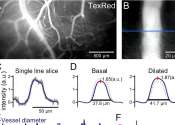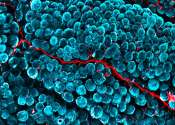What your feet can tell you about your health
From skin to hair, scabs and even tears, the external appearance of the body can offer clues about the state of your health.
Apr 30, 2024
0
0
From skin to hair, scabs and even tears, the external appearance of the body can offer clues about the state of your health.
Apr 30, 2024
0
0

Compared with computers, the brain can perform computations with a very low net energy supply. Yet our understanding surrounding how the biological brain manages energy is still incomplete. What is known, however, is that ...
Apr 26, 2024
0
36

Conditions such as diabetes, heart attack, and vascular diseases commonly diagnosed in people with spinal cord injuries can be traced to abnormal post-injury neuronal activity that causes abdominal fat tissue compounds to ...
Apr 24, 2024
0
38

Researchers at the Beckman Institute for Advanced Science and Technology have developed a new technique to make ultrasound localization microscopy, an emerging diagnostic tool used for high-resolution microvascular imaging, ...
Apr 22, 2024
0
30

Researchers have developed a new shoe insole technology that helps reduce the risk of diabetic foot ulcers, a dangerous open sore that can lead to hospitalization and leg, foot or toe amputations.
Apr 19, 2024
0
21

Beetroot has been in the news for all the wrong reasons. Supply issues in recent months have seen a shortage of tinned beetroot on Australian supermarket shelves. At one point, a tin was reportedly selling on eBay for more ...
Apr 12, 2024
1
29

Examining the immune cells in the environment around a tumor could help to predict how a person's cancer might progress and respond to treatment, according to new research led by UCL and the Francis Crick Institute.
Apr 10, 2024
0
0

Researchers at the University of Toronto and its partner hospitals have created a unique heart-on-a-chip model that is helping untangle the causes of COVID-19-induced heart inflammation and uncover strategies to reduce its ...
Apr 8, 2024
0
84

People with diabetes who had suffered a heart attack derived no clinical benefit from edetate disodium-based chelation, a therapy that draws lead and other toxic metals linked to increased risk of heart disease and stroke ...
Apr 8, 2024
0
0

A single subcutaneous injection of the investigational drug zilebesiran, when added to existing treatment with a standard antihypertensive medication, reduced systolic blood pressure by between 4 to 12 mmHg on average at ...
Apr 8, 2024
0
0

The blood vessels are the part of the circulatory system that transport blood throughout the body. There are three major types of blood vessels: the arteries, which carry the blood away from the heart, the capillaries, which enable the actual exchange of water and chemicals between the blood and the tissues; and the veins, which carry blood from the capillaries back towards the heart.
This text uses material from Wikipedia, licensed under CC BY-SA